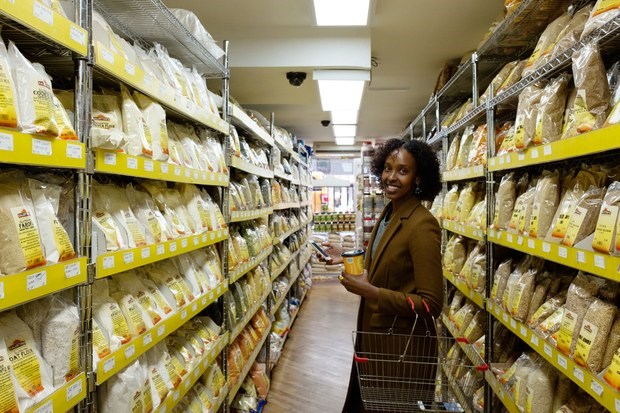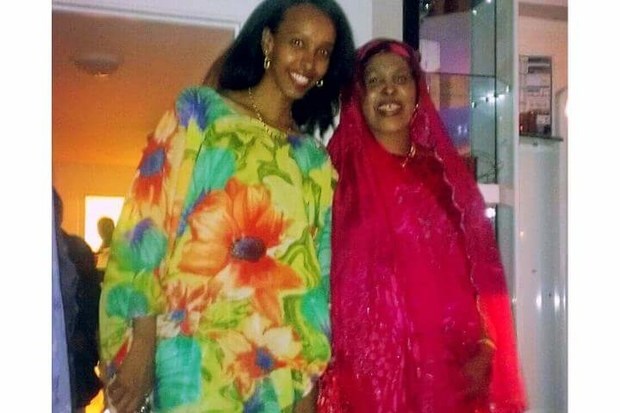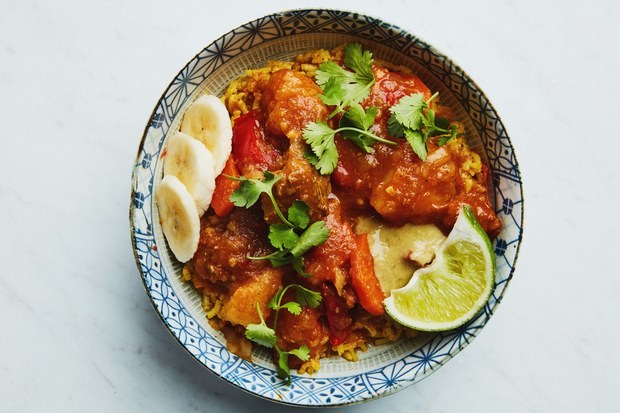Epicurious
Thursday June 22, 2017
I'm in the middle of what is basically a bodega, eating a plump fresh date I've just been given by the store's proprietor, when I realize that I'm having one of the best shopping experiences of my life.
How is it possible that this high point is happening in a bodega—New York City's version of the corner store? Probably because I'm standing next to Hawa Hassan, whose smile and laughter is practically contagious, and I'm on the hunt for halal beef, something I've never shopped for, that's how.
This shop, on a block in Murray Hill, a neighborhood just south of Midtown in New York, is the third one that Hassan has taken me to in order to find ingredients for the Somali lunch she's cooking for us.
The Somali community in New York is small, she tells me. "Like many immigrant communities, they stayed close to each other—and in our case, that meant places like Minnesota, where many early immigrants happened to reach," she says. And because there's not a Somali-specific store in town, we start the day out in the city's well-stocked Middle Eastern and specialty foods store, Kalustyan's, to pick up a variety of spices—whole cardamom, cinnamon sticks, cumin seeds—as well as the vegetables and rice that Hassan will turn into the Somali beef stew, Bariis Maraq, that she'll cook later on.
But Kalustyan's doesn't sell meat, so we wander next door, into a small shop that sells everything from Middle Eastern and African spices and honeyed pastries to candles and incense that reminds Hassan of her mother. "My mom always burns this," Hassan said as we wander through the store. "It's called unsi," she explains when I ask about it later. "It's incense that's burnt after meals are made or when we're expecting a guest."
There's no fresh meat, but the friendly attendant suggests another store, just down the block. Walking into the third shop, Hassan greets the owner with a few kind words in Arabic, and in turn he offers us the dates, and then pieces of sweet Middle Eastern treats, a coconut candy that we save for the train ride back to Brooklyn.
I'm in heaven, and I never want to go shopping without Hassan again. "Despite what you might read in many circles, most immigrant communities help each other out, they know they have a lot in common," she says as we walk away from the store. "It’s there in Muslim communities from different parts of the world: unspoken kindness, tender gestures, referring to each other as ‘my child’ and ‘my sister’ like we’re all family, which we are."
As we walk out, I beam in her glow and the excitement of the shopping experience, and as we nibble on the coconut candy and chat about food, cooking, and Somalia on our train ride home, I wonder if it's possible to have developed a love for Somali food without having ever really tasted it.
Like many people who meet Hassan, my first taste of Somali cuisine came when I met her at a food event where she was sampling her Basbass Somali chile sauces, a creamy cilantro and tangy tamarind mix she served with tortillas like salsa. "I want to help bring Somali cuisine to a global audience," she says. "Basbaas are traditional Somali sauces with a sweet and tangy twist, the perfect complement to every dish."
Hassan only spent a few years living in Mogadishu, the capital of Somalia—her mother and siblings fled the country when she was four when civil war broke out in 1991—but she still feels a deep connection to the country. "I remember Somalia very well," she says. "I remember papaya trees and eating a lot of dates. I remember going to the beach on the weekends. I remember going to my grandfather’s country house. I just remember Somalia buzzing with good energy and kids playing in the street, parents drinking tea in the afternoon."
After leaving Somalia, Hassan's family first landed in a refugee camp in Kenya, where they spent several years. Her mother operated a small shop, selling basic goods like toilet paper and rice to the other refugees, and Hassan, the eldest daughter, helped out in the shop, perhaps foreshadowing her own business skills to come. But when Hassan was seven, an opportunity opened for her to move to the United States. "I was sent to Seattle to live with a group of Somali people because my mom found sponsorship for me," she says. "
[My mom] was waiting on her sponsorship and she originally thought they were going to be following me."
Although Hassan's mother hoped to resettle the entire family in America, this was never possible; her mother and nine siblings eventually moved to Oslo, Norway. It was 15 years before she saw her family again. "I remember feeling like this is so strange, but as time went on I made really good friends," Hassan says. "I had my best friend and her family. I had school teachers that really cared about me."
In high school, the lean and striking Hassan was approached by a modeling scout, which eventually brought her to New York City. She worked for several years as a fashion model, but eventually burned out. Wanting to refocus and spend time with her family, Hassan headed to Oslo. "I spent four months with them and just watched everything my mom and sisters did in the kitchen," she said.
During this time—the first time she had spent more than a week with her mother and sisters since being separated from them as a child—she was inspired to start Basbaas. "Reconnecting with my family and sharing meals together made me yearn for flavors I grew up loving," she says. "At first, I wanted to share those sensations with everyone I knew. Seeing their reactions inspired me to launch my own line of Somali sauces."
Back in Brooklyn, Hassan begins cooking our lunch by teaching me how to make xawaash spice mix, the base of the beef stew and rice dish she'll be preparing.
Once the spice mix is made, Hassan puts together the fragrant rice, cooked with tomatoes and red onions—which Hassan says is a must for Somali cuisine. And then the beef stew. It's a recipe Hassan says her mother would make often for the family, easy to quickly pull together for a big crowd. It's not unlike a traditional American beef stew, with its combination of beef, carrot, onion, and potato, but the real Somali flavor comes from that xawaash spice mix, which gives it a warm, rich, peppery flavor.
The best thing about this recipe: no special ingredients required! Although a taste of the xawaash spice mix can make you feel as though you've take a trip to Somalia, you've likely got all the spices necessary to make it in your pantry already. Which means a taste of Hassan's home country is only a pot of stew away.
"The cubed beef is the Somali meat of choice, or goat or lamb," she says. "You can also make it with chicken. And I added the bell peppers for more color, but they aren't necessary." Not necessary, but they are pretty, and the stew is delicious. I walk away, a belly full of Somali beef stew, just as happy as I was when I arrived.
A few days later, I'm back in the Epi Test Kitchen, where we've cooked a big pot of the stew to test the recipe out, when I get a text from Hassan that she's nearby. She stops by the office to help us taste, and as I'm dishing out the bowls, I start to worry if my colleagues will be as enamored with Somali food as I am. "You've got to try it with the fresh banana," Hassan encourages my coworkers. "It's classic Somali, we love savory and sweet together." They look skeptical.
But just like Hassan says, this dish really brings a crowd together. "This sauce is delicious!" Anna says. "I love the banana," says Kat B. They are both so right; this simple dish really is so delicious, especially with the toppings. The Basbaas sauces make the perfect garnish for this stew: the creamy cilantro sauce adds a tangy brightness, the tamarind sauce gives as additional kick of heat. (You can order Hassan's online, or look for Indian-style cilantro and tamarind sauces as a substitute.)
And the sliced banana really is a must! It might sound strange, but it's so delicious, and does give a great balance of sweetness to the spicy stew. With a squeeze of lime juice and some sprigs of cilantro, it's refreshing and filling dish and great any night of the week. Which is exactly when Hassan and her family like to eat it.



